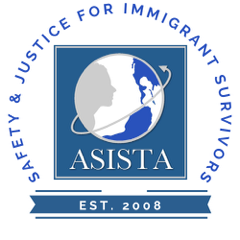Serving Survivors Who May be At Risk of Immigration Enforcement Actions
ASISTA condemns the Administration’s plans for mass raids, now slated to start this Sunday. These mass immigration enforcement actions create immense fear in communities nationwide. For immigrant survivors of violence, these raids exacerbate the trauma and fear they already endure because of the abuse they have experienced.
Advocates can help address this fear by providing critical know your rights information and sharing ways survivors can prepare themselves in the event they are confronted by ICE. Below is a list of actions practitioners working with immigrant survivors of domestic violence, sexual assault and human trafficking can take now to help survivors who are at risk of an immigration enforcement action.
Know Who is At Risk: The most recent enforcement action had targeted families and those with old deportation orders. Recent reports also indicate there may be “collateral arrests”.
Share Know Your Rights Materials: Many advocacy groups have prepared materials to help immigrants know their rights in the event of an immigration enforcement action, these include:
- Informed Immigrant: This is a resource both for advocates and the general public on know your rights materials and preparedness planning (also available in Spanish/Español)
- ACLU: Comprehensive resources for immigrants on exercising their rights in different scenarios including when ICE is at a residence, or if stopped in transit. These materials are available in multiple languages
- Immigrant Legal Resource Center: ILRC has developed extensive know your rights materials as well as family preparedness plans in multiple languages.
- CLINIC: CLINIC has created a rapid response toolkit as well as a guide entitled “Know Your Rights: A Guide to Your Rights When Interacting with Law Enforcement” available in nine different languages.
- Check out ASISTA’s website for other resources
Triage Individual Cases: If already working with survivors, advocates and attorneys should screen their cases for individuals with final orders of removal. Once identified, attorneys should consider drafting precautionary filings for these survivors, such as stays of removal and motions to reopen (for examples in the VAWA context click here). This preparation will help ensure that, if your clients are picked up in an enforcement action, you are ready to file the paperwork necessary to stop their swift removals and argue for their release from detention.
Connect to Resources: American Immigration Council has great practice resources on challenging Notices to Appear, Motions to Reopen EOIR-Issued Removal Orders, Reinstatement of Removal and others.
ASISTA is available to provide our membership individual case assistance for their work serving immigrant survivors. Please click here to learn more about ASISTA membership and email us at questions@asistahelp.org for help strategizing for survivors who may be at risk, including those who may not be eligible for VAWA motions to reopen.
